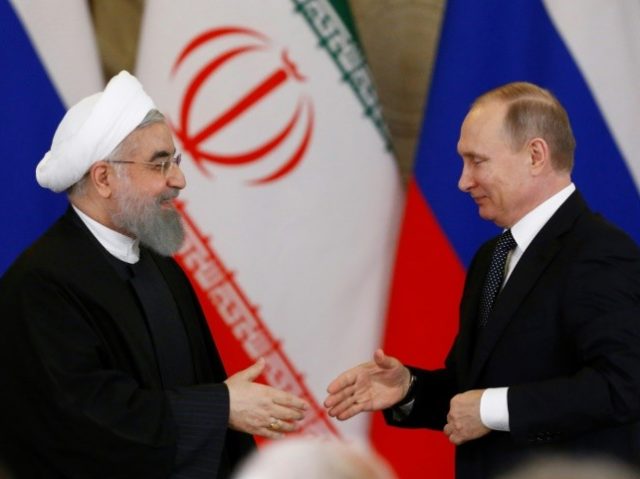Officials in both Russia and Iran are threatening retaliation against new sanctions imposed by the U.S. House of Representatives on Tuesday.
The sanctions bill passed by a vote of 419-3, its overwhelming support partially attributed to the way it challenges President Donald Trump’s authority by pre-empting any White House effort to weaken sanctions on Russia. All three of the “no” votes were from Republicans: Representatives Justin Amash of Michigan, Tom Massie of Kentucky, and John Duncan of Tennessee.
House Speaker Paul Ryan (R-WI) described the measure as “one of the most expansive sanctions packages in history” and said it “tightens the screws on our most dangerous adversaries in order to keep Americans safe.”
The future of the bill in the Senate is unclear at the moment. “I guess the House is sending something over and we’ll have to figure out what to do with it,” Senate Foreign Relations Chairman Bob Corker (R-TN) shrugged in a CNN interview.
Russia and Iran were quick to express outrage after the strong bipartisan vote for the House bill. Russian Deputy Foreign Minister Sergei Ryabkov said the measure leaves no “room for the normalization of relations” between his country and the United States. Ryabkov said the House vote “goes beyond the realms of common sense.”
Parliamentary chairman Konstantin Kosachyov complained the “anti-Russian consensus in Congress makes dialogue impossible and for a long time.” In a Facebook post, he said Russia should prepare a reaction that would be “not a symmetrical one, but painful for Americans.”
Russian Senator Alexei Pushkov predicted President Trump will be forced to sign the sanctions bill into law because “he’s a prisoner of Congress and anti-Russian hysteria.” Russian parliamentarians threatened retaliatory measures, which Pushkov hinted might include “sanitary sanctions” against McDonald’s, a favorite punching bag for frustrated Russian officials.
CNBC rounded up analysts who said it was unlikely Russia could engineer truly painful economic sanctions against the United States and were likely to pursue a “more symbolic than substantive” response, although the possibility that President Vladimir Putin will come down hard on a few specific corporations like McDonald’s cannot be discounted.
“The news is very sad, in terms of US-Russia relations, and the perspective for their development. And also for international law, and international trade relations – according to what information we have on this bill,” said Kremlin spokesman Dmitry Peskov.
Iran likewise declared the sanctions bill “a completely clear hostile act” that will be met with a “definitive response,” as Deputy Foreign Minister Abbas Araqchi put it on Wednesday.
Araqchi implied that the sanctions would violate America’s commitment to “follow the nuclear deal with goodwill and in a productive environment and to hold back from any steps that would have an effect on the successful execution of the deal.”
Iran’s ostensibly “moderate” President Hassan Rouhani also threatened retaliation by quoting a verse from the Quran: “If the enemy puts part of their promises underfoot then we will also put part of it underfoot. And if they put all of their promises underfoot then we will put promises underfoot.”
“The Koran also advises that if enemies are really pursuing peace and want to put enmity aside and act appropriately toward you, then you should do the same,” he added.
Rouhani promised to “take any action that is necessary for the country’s expedience and interests,” and reiterated Iran’s determination to develop “defensive means without attention to others.” Iran’s ballistic missile program is one of the motivating factors behind the sanctions supported by the U.S. House of Representatives.
The House vote also drew some unflattering attention from the European Union, whose President Jean-Claude Juncker warned it could have “unintended unilateral effects that impact the E.U.’s energy security interests.” In other words, the sanctions bill could hurt European countries working on oil pipelines to Russia.
Juncker went as far as suggesting Europe might retaliate against the United States if the House bill becomes law, insisting that “America first cannot mean that Europe’s interests come last” and promising that his commission stands ready to “act appropriately within a matter of days.”
The French foreign ministry issued a statement suggesting the sanctions imposed by the House bill would run contrary to international law, and the European Union might not be willing to make the adjustments to its own laws necessary to comply.
The House bill also includes sanctions against North Korea, which Corker said the Senate might remove and place into a separate bill. The office of House Majority Leader Kevin McCarthy (R-CA) responded by saying sanctions against North Korea are an urgent priority and stripping them out would keep the bill from a final vote before the August recess.
Those North Korea sanctions would affect China, which has expressed anger at all U.S. sanctions harming it either directly or indirectly. Chinese officials have hinted that American sanctions could make them less willing to cooperate on resolving the North Korean crisis.

COMMENTS
Please let us know if you're having issues with commenting.